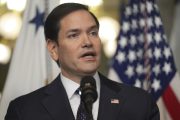
For too many years, regardless of whether the occupant in the White House is a Republican or Democrat, the President has generally pursued a course of more socialism at home and more interventionism abroad. Consider the TARP bailout of the big financial institutions: GOP Senator John McCain and Democrat Senator Barack Obama both voted for the TARP legislation prior to the 2008 election — an election that supposedly pitted an opponent of redistributing the wealth (remember how McCain embraced “Joe the Plumber”?) against an advocate of socialism. Despite the rhetoric, if McCain were elected President in 2008, he could have been expected to continue supporting socialist bailouts, just like the last GOP President, George W. Bush, did.
But in the primaries, there are often candidates who really do offer a choice and not an echo. Such candidates — like those who attempt to offer a real choice via third-party efforts — are often ignored by the mainstream media or, if they seem to be catching on, portrayed as “fringe” or having no chance of winning. Yet the primary battles could prove the talking heads wrong. Even when they don’t, presidential candidates offering a strong message can help to change the political debate and even change the political climate to the point that better people can be elected to Congress. It is hard to imagine Rand Paul being elected to the U.S. Senate, for example, without the Ron Paul candidacy of 2008.
The New American recently profiled 11 Republican candidates for President (The article on Tim Pawlenty was written prior to his dropping out of the race). We encourage readers to review these profiles to become much better informed about the records and stated positions of each candidate:
We also recently contrasted the 2008 campaign rhetoric of Barack Obama with his performance as President on constitutional issues. To go to the article, click here.


